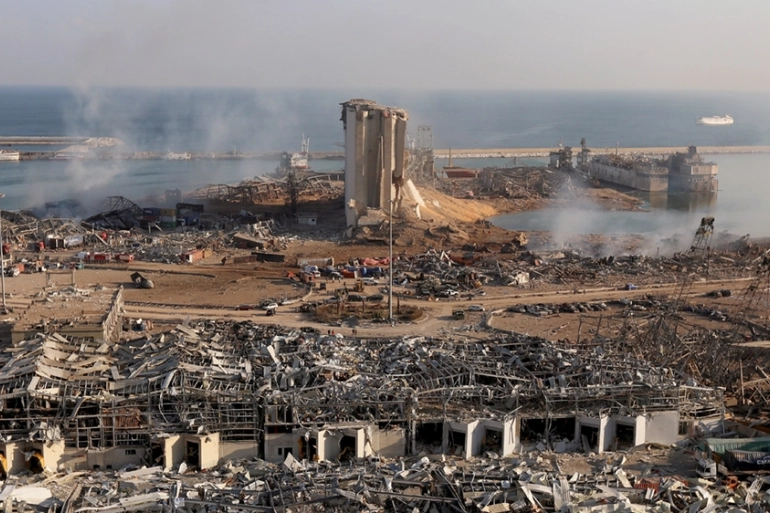
On August 4, 2020, nearly 2,750 tonnes of improperly stored ammonium nitrate exploded in the seaport in Beirut, killing more than 200 people, injuring more than 6,000, and displacing thousands from their homes. As Beirut residents still await answers from the official investigation, it is important not to brush aside this incident as the product of exceptional circumstances.
The widespread use of ammonium nitrate makes similar deadly explosions quite possible across the world. Equally concerning is the significant role this chemical plays in environmental degradation and climate change, which is also deadly. That is why it is crucial that the international community takes action beyond aiding the Lebanese authorities in the aftermath of the explosion.
Ammonium nitrate is an odourless substance that is commonly used to make fertiliser and explosives. Nitrogen fertiliser production accounts for nearly 1.2 percent of global primary energy demand, generates pollutants like fine dust, nitric acid emissions, and produces wastewater that may contain phosphorus, fluorides, ammonia, carbon dioxide, or weak acids. About 80 percent of manufactured ammonium nitrate is used for fertiliser, particularly in the global agro-industrial system.
Nitrogen is essential for plant growth. Ammonium nitrate fertiliser gained popularity after World War II as an inexpensive source of plant nutrients. Plants can more easily absorb synthetic fertiliser than naturally occurring nitrogen in the soil. The widespread use of nitrogen-based fertilisers has increased crop yields. However, fertiliser overuse has depleted naturally-occurring nutrients in the soil, making the agro-industrial system reliant on fertilisers to support its productivity.
Ammonium nitrate use can not only lead to tragedies like the Beirut blast but also cause much harm to nature and humans.
The overreliance on external inputs, such as ammonium nitrate, also comes at the expense of the health of farmworkers and consumers, the environment, and our climate.
Nitrogen-rich fertilisers are a key source of ammonia emissions, which combine with other air pollutants to form fine particulate matter. Particulate matter exposure can cause heart and pulmonary disease and has been linked to thousands of premature deaths in rural farming communities. Direct chemical exposure is especially harmful to farmworkers who regularly come into contact with fertilisers and other inputs.
Ammonium nitrate and its production also contribute to global warming. The use of nitrogen fertilisers, along with manures and other agricultural sources, accounts for nearly 60 percent of nitrous oxide emissions. Nitrous oxide is a powerful greenhouse gas that can trap heat 300 times more than carbon dioxide, contributing to rising global temperatures.
Nutrients that are not absorbed by the soil or plants contaminate water sources, which is harmful to aquatic life. A visible expression of this disturbance is the annual dead zones in the Gulf of Mexico and the Gulf of Oman. Dead zones are caused by eutrophication, which happens when a body of water is contaminated by excess nutrients. Eutrophication increases algal growth, depletes oxygen in the water, and results in an environment where marine life cannot survive.
Additionally, the widespread overreliance on synthetic fertiliser is disrupting the Earth’s natural nitrogen cycle, which is one of Earth’s nine planetary boundaries. Planetary boundaries define the safe operating spaces for humanity, which, once crossed, can cause irreversible environmental damage that may have disastrous repercussions for our current way of life. Regulating the Earth’s natural nitrogen levels in the air, soil, and water, are necessary to sustain life and ensure a healthy environment. This requires rethinking global food production methods that do not transgress Earth’s planetary boundaries.
In order to avoid future incidents like the explosion in Beirut, but also tackle climate change and environmental degradation, we have to curb the use of ammonium nitrate.
Some may argue that reducing the use of fertilisers would threaten food security and sovereignty, especially in areas prone to famine. But that is not the case. Agroecology is emerging as a holistic answer to the challenge of growing enough food to feed ourselves without damaging the environment or contributing to global warming.
Agroecology is an integrated approach to agriculture that seeks to optimise the interactions between plants, animals, humans, and the environment to enable sustainable and fair food production based on local knowledge and traditional agricultural practices. This approach can help meet the global needs of food sovereignty and food security in a world that seeks to divest from carbon and nitrogen.
International climate initiatives are beginning to pay attention to agroecology. For example, under the UN Framework Convention on Climate Change and its Koronivia joint work on agriculture, the Climate Dialogues have discussed the intersection of food security and climate change. It is encouraging that states are beginning to include agroecology in their Nationally Determined Contributions and National Adaptation Plans under the Paris Agreement on Climate Change.
However, what is currently being done is not nearly enough. For example, in a couple of months, UN Secretary-General António Guterres is convening the 2021 Food Systems Summit, which seeks to “transform the way the world produces and consumes food”. This high-level event, however, appears dominated by agro-industrial interests, which are resisting divestment from nitrogen. Meanwhile, the ammonium nitrate market continues to grow and by 2026 is expected to be worth $19bn.
The 2021 Food Systems Summit should make agroecology the centrepiece of its strategy for the realisation of the right to food and the right to a healthy environment. The summit should discuss the recent calls for global agricultural subsidy reform to address agriculture’s role in the climate crisis.
The summit can be the first step towards divestment from nitrogen. The UN should work with its members towards removing subsidies for nitrogen-based fertilisers. It should also encourage countries that give out agricultural subsidies (currently amounting to $480bn globally) to prioritise crops that are less emission-intensive and to fund research and development of sustainable farming practices.
The Beirut explosion was avoidable. So are climate change, dead zones in the seas, and the disruption of the global nitrogen cycle. Urgent action is needed to save human lives and our planet.

By Marcos A Orellana – UN Special Rapporteur on toxics and human rights




 World Opinions Débats De Société, Questions, Opinions et Tribunes.. La Voix Des Sans-Voix | Alternative Média
World Opinions Débats De Société, Questions, Opinions et Tribunes.. La Voix Des Sans-Voix | Alternative Média




